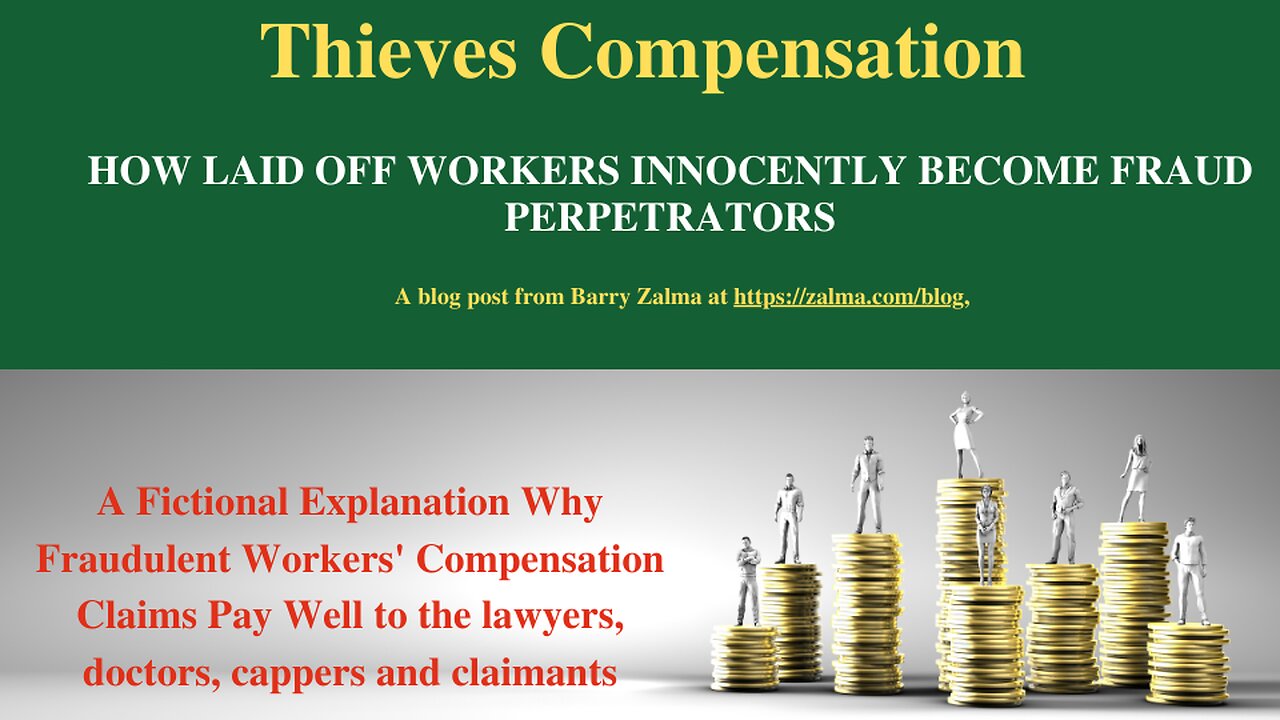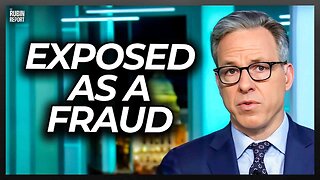Premium Only Content

Thieves Compensation
How Laid Off Workers Innocently Become Fraud Perpetrators
The story that follows is fiction. It is based, however, on a true situation faced by employers and workers' compensation insurers in Californian where I live.
Ralph was a good employee. He arrived for work every day on time. He did his job eight hours a day and never goofed-off. He was loyal to his employer. His diligence got him raises and promotions.
In December 2022 Ralph's boss came to him and said, regretfully: “The market fall has hit me hard. I can’t afford to keep paying you. You are laid off.”
He was shocked. He could say nothing. He could do nothing to keep his job. He packed up his personal belongings, said “goodbye” to his boss and left.
The next day, he went to the state unemployment office. He filed the first claim in his life for unemployment benefits. He was ashamed but had no choice.
Coming out of the unemployment office he met a pleasant man who offered him a cup of coffee. Having nothing better to do, he accepted the man's offer of a cup of coffee and sat, drinking it, on a bus bench and talked about his troubles.
The man asked detailed questions about Ralph’s job. He explained that the employer was not alone. Other people were suffering just like he was. He explained there was a way to tide Ralph over better than unemployment insurance.
The employee was dumbfounded.
“Are you offering me a job?” he asked.
“No. I am only offering a way to make yourself some money without any effort.”
“Is this legal,” the employee asked.
“Of course." The kind man replied. "I will refer you to a lawyer I know who will help you file a very legal claim before the Workers' Compensation Appeals Board.”
The man gave him the lawyer's card. He explained that under the laws of the state, employees are entitled to medical treatment and benefits if they are injured on the job, even if the injury is emotional. These benefits pay weekly. Since they are tax free, they almost equal Ralph's take home as the designer of websites before he was laid off. The kind man explained that the Workers’ Compensation Appeals Board set the lawyer’s fee and that would usually be a small percentage of the benefit received.
“But I wasn't injured on the job,” Ralph responded.
“You just told me how other people had been laid off before you and it had caused you worry and concern. This, I have been told, is a form of stress which a doctor will state is a work related emotional injury” explained the nice man.
Ralph, recognizing that his chance of finding a new job in the website development programming industry was small, finished his coffee, took the lawyer's card and went directly to the lawyer’s office that was a short walk from the unemployment office.
The lawyer told the employee that it appeared he had a good stress related workers' compensation claim. He had Ralph sign a contingency fee agreement. He then sent Ralph to a doctor who did a ten-minute physical examination and a five-minute interview.
After completing his fifteen minutes of work, the doctor told his secretary to prepare a report. She used a standard report form already recorded in her word processor. The report contained twelve pages of medical jargon that concluded that Ralph, the employee, was permanently disabled as a result of job related stress. He gave the report directly to Ralph and told him to deliver it to the lawyer.
The lawyer than presented the claim and, with little difficulty, obtained a permanent disability rating for the employee based on the doctor's report. The employer’s workers’ compensation insurer paid the doctor’s bills, the lawyer received his fee and Ralph received disability payments.
The solicitor outside the unemployment office received a flat $500 fee from the lawyer for the referral. The doctor, who billed $600 for the complete examination and evaluation, gave the lawyer $200 as the lawyer's fee for the referral. Everybody did very well except the workers' compensation insurer and the employer whose business was having enough difficulties without finding its workers' compensation premiums increased.
Ralph received from the workers' compensation benefits, a bonus on top of his unemployment benefits that were sufficient to carry him into his new job six month later with a small nest egg.
The insurance buying public, every employer in the state required to maintain workers' compensation insurance, the workers' compensation insurers, and the Workers' Compensation Appeals Board must spend time and money processing a fraudulent claim. The employee did not even know that he was committing a fraud since he relied on the advice of his less than honest lawyer.
In most states it is a crime to solicit business for a lawyer for a fee. It is a crime to pay kickbacks to lawyers for referring clients for medical services. It is a crime to present a fraudulent claim to the Workers' Compensation Appeals Board. None of the participants were concerned, investigated or arrested.
The workers' compensation system, and the money in the system, hangs from a branch like ripe fruit ready to be picked. The lawyer, his capper/runner and the doctor could not resist picking that fresh fruit. Ralph was one of 15 people the nice man recruited outside the unemployment office and one of 200 he referred to the lawyer that month.
This type of crime will continue, despite the criminal penalties, if the employers and insurance industry fail to make clear to all employees in the state that the presentation of a false workers' compensation claim is a crime and the state prosecute those involved in the crime: the capper, the doctor, the lawyer and the innocent criminal like Ralph.
The abundances of workers' compensation frauds are destroying the business community. The cost of maintaining workers' compensation insurance, or in paying benefits as a permissively self-insured, as a result of fraud, runs in the billions of dollars. If workers' compensation stopped, most of those people laid off as a result of a technology downturn or recession of 2021-2023 could be rehired.
It is time that the public is informed that insurance fraud is stealing money from their pockets, not some rich insurance company. People perpetrating insurance fraud in California alone steal multiple billions of dollars from the insurance industry that loses across the USA $308 billion every year.
Fewer people perpetrate this massive insurance fraud than participated in the Portland riots. It is a crime performed without violence. It pays well.
Rather than burning a building, the person committing workers' compensation insurance fraud merely signs his name to a claim form, submits a claim to the WCAB, and waits for the money to flow.
Although not a violent crime, the crime of insurance fraud has become so rampant that a task force akin to the one used to assist those damaged by Hurricane Ian is needed but will never be constituted. Rather, prosecutors, shy away from insurance fraud cases as if the officer presenting it was infected with a contagious flesh-eating bacteria. As long as it is easy, safe and profitable, insurers and employers who are self-insured will continue to be victims who are considered villains by the public and the courts.
They, like rape victims in the middle east, are considered responsible for the crime perpetrated against them, and the actual criminals go free.
(c) 2023 Barry Zalma & ClaimSchool, Inc.
Subscribe and receive videos limited to subscribers of Excellence in Claims Handling at locals.com https://zalmaoninsurance.locals.com/subscribe.
Go to substack at substack.com/refer/barryzalma Consider subscribing to my publications at substack at substack.com/refer/barryzalma
Barry Zalma, Esq., CFE, now limits his practice to service as an insurance consultant specializing in insurance coverage, insurance claims handling, insurance bad faith and insurance fraud almost equally for insurers and policyholders. He practiced law in California for more than 44 years as an insurance coverage and claims handling lawyer and more than 54 years in the insurance business. He is available at http://www.zalma.com and zalma@zalma.com
Write to Mr. Zalma at zalma@zalma.com; http://www.zalma.com; http://zalma.com/blog; daily articles are published at https://zalma.substack.com. Go to the podcast Zalma On Insurance at https://anchor.fm/barry-zalma; Follow Mr. Zalma on Twitter at https://twitter.com/bzalma; Go to Barry Zalma videos at Rumble.com at https://rumble.com/c/c-262921; Go to Barry Zalma on YouTube- https://www.youtube.com/channel/UCysiZklEtxZsSF9DfC0Expg; Go to the Insurance Claims Library – https://zalma.com/blog/insurance-claims-library
-
 8:57
8:57
Barry Zalma, Inc. on Insurance Law
1 year agoNo Coverage for Benefits no Right to Bad Faith Damages
193 -
 1:58:33
1:58:33
The Charlie Kirk Show
2 hours agoAmerica's Spiritual Revival + Runaway Judges + Vivek For Ohio | Habba, Waggoner, Vivek | 2.27.2025
46.2K3 -
 58:33
58:33
The Dan Bongino Show
4 hours agoAmerica's A-Team Hits The Ground Running (Ep. 2432) - 02/27/2025
599K806 -
 1:19:38
1:19:38
The Rubin Report
3 hours agoCNN Host Brutally Mocked for Trying to Profit Off of What He Called a ‘Conspiracy’
47.2K21 -

Benny Johnson
19 hours ago🚨BREAKING: Epstein List, Flight Logs RELEASED Any Minute By Trump | ELITES IN PANIC
101K76 -
 2:10:17
2:10:17
Steven Crowder
5 hours agoEpstein File Watch & DOGE’s $17M Muppet Show Explained
411K290 -
 1:04:22
1:04:22
Timcast
4 hours agoTrump Orders ALL TRANS MILITARY Discharged, Trans Person CAUGHT With BOMBS At Tesla Dealership
103K111 -
 2:01:41
2:01:41
LFA TV
18 hours agoPAYBACK = JUSTICE! | LIVE FROM AMERICA 2.27.25 11AM
54.4K17 -
 DVR
DVR
Bannons War Room
9 days agoWarRoom Live
2.4M416 -
 2:17:39
2:17:39
Matt Kohrs
13 hours agoBREAKING MARKET NEWS: Bounce or Bust?! || The MK Show
69.6K1